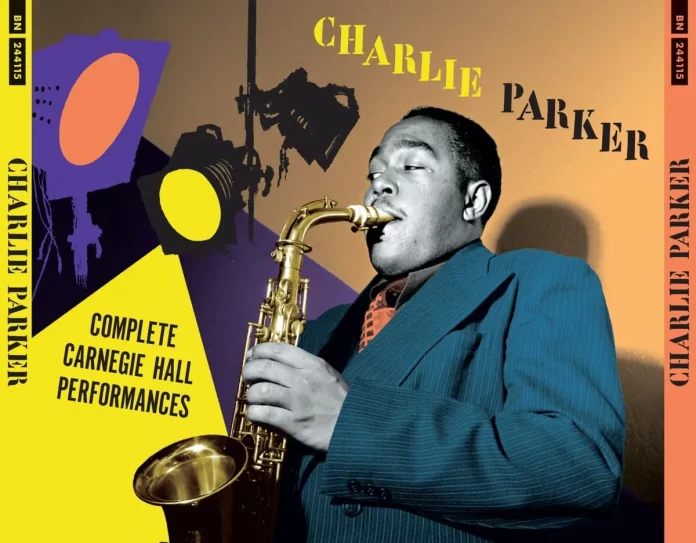It seems odd to tie jazz to a building, and surely the works of no other musician could produce four full CDs of classic music from it (well, Goodman had a lot of help).
You’d be doing well if you got more value for £16 than this beautiful set. As a universal yardstick, all of Parker’s music is classic but this one is a notch above, typified by the opening Night In Tunisia, which has a Parker break as dazzling as the more famous one. There’s a bit of magic in the fact that, although sometimes Dizzy or one of the trumpets or pianists is recorded off-mike, Bird’s message to the world always comes through with that declamatory clarity.
Brian Priestley recalled Teddy Reig’s account of getting Charlie to one of the first all-bebop concerts held there in September 1947: “We went to his room and broke down the bathroom door. We got him out of the tub, dried him, dressed him, got him in a cab, stuck the horn in his hands and pushed him from the wings onto the stage.” The resultant alto playing was “unbelievable”.
Bird was usually featured at the regular Monday night JATP concerts held in the hall and there are several of them here, by my reckoning about an hour and 40 minutes of them, with, as well as Bird, Flip in full honk, Hawk, Lester, Hank Jones, Buddy Rich and some of the lesser featured “stars” in Fats Navarro, Tommy Turk (Bill Harris in knee pants) and Sonny Criss. There are lots of the gauche Parker with strings and the more powerful Parker with Machito formulae.
Conversely you have to put up with a lot of raw noise on, for example No Noise, which is not worth listening to. CD4 also harbours a much impaired seven-minute Night In Tunisia with Parker listenable despite a constant battery from Roy Haynes. And Flip, not Bird, features on Tanga. Familiarity breeds respect, and there are just under 20 tracks by what may be described as Parker Quintets (with apologies to Dizzy).
You can’t have a rumbustious performance from John Lewis (although I remember him once inadvertently belching during an announcement) but every bit as much as Bud Powell he was the key pianist in modern jazz of this period. However, the MJQ on the (10) tracks is virtually inaudible. It’s fascinating and riveting to hear Bird flying without much interruption on a flying Song Is You and a reflective Funny Valentine with merely a bit of pounding from Clarke. But Bird hears the quartet and his improvisations are imperturbably clear and lucid. He wails joyously on Cool Blues, too.
The liner note speculates that Bird tired quickly of the string routines, and that his frustration can be heard in his temper. I don’t agree, and the only element that justified such misfiring pretence was the soloist’s ability to play passionately over the encumbrance as though it wasn’t happening. Likewise Machito’s magnificent orchestra, so good at Cuban stuff, benefited from having Bird stuck on to it, although one feels it was Bird that had . . . well, never mind.
This album delivers the exciting experience it appears, on paper, to be. But let’s be clear, the original balance is sometimes so awful that if lesser beings were involved we wouldn’t bother listening. But when it’s good, as in the five-minute Ornithology, Parker lives up to the god-like reputation (a word for his acolyte Red Rodney on these tracks, always interesting and reliable, accepting the inevitability of being pre-empted by the jazz Leonardo’s solos on things like Cheryl or the fabulously articulated Ko-Ko where Haig has a small dazzle of his own).
The hard work that its compilers have put into this has also produced a valuable record of the history of the period.
Discography
CD1: (1) A Night in Tunisia; Dizzy Atmosphere; Groovin’ High; Confirmation; Ko-Ko; (2) The Bird; (3) Repetition; (4) Leap Here; Indiana; Lover Come Back To Me (71.32)
CD2: (5) The Opener; Lester Leaps In; Embraceable You; The Closer; Ow; Flying Home; How High The Moon; Perdido (68.01)
CD3: (6) Ornithology; Cheryl; Ko-Ko; All The Things You Are; (7) Now’s The Time; (8) What Is This Thing Called Love?; April In Paris; Repetition; (8) Easy To Love; Rocker; Just Friends; Easy To Love; Repetition; (8) Just Friends; Easy To Love; Repetition; Just Friends; Easy To Love (63.48)
CD4: (9) A Night In Tunisia; 52nd Street Theme; (10) The Song Is You; My Funny Valentine; Cool Blues; (11) No Noise; Mango Mangue; Tanga; (12) Bean And The Boys; Stuffy; Mambo; (13) Lament For The Congo; (14) I Can’t Get Started (61.51)
Parker (as, except on Tanga) with:
(1) Dizzy Gillespie Quintet: Gillespie (t); John Lewis (p); Al McKibben (b); Joe Harris (d). 29 September 1949.
(2) Hank Jones (p); Ray Brown (b); Shelly Manne (d). December 1947.
(3) Neal Hefti Orchestra. December 1947.
(4) JATP: Fats Navarro (t); Tommy Turk (tb); Sonny Criss (as); Flip Phillips (ts); Hank Jones (p); Ray Brown (b); Shelly Manne (d). 11 February 1949.
(5) JATP: Roy Eldridge (t); Tommy Turk (tb); Lester Young, Flip Phillips (ts); Hank Jones (p); Ray Brown (b); Ella Fitzgerald (v, on Flying Home, How High The Moon and Perdido). 17 & 18 September 1949 (overnight).
(6) Red Rodney (t); Al Haig (p); Tommy Potter (b); Roy Haynes (d). 24 December 1949.
(7) with strings. 1st concert. 16 and 17 September 1950 (overnight).
(8) with strings: same as (7) second concert.
(9) same concert as (7) minus strings: Dizzy Gillespie (t); Walter Bishop (p); Walter Yost (b); Roy Haynes (d).
(10) John Lewis (p); Percy Heath (b); Kenny Clarke (d). 25 September 1954.
Bird’s Nest BN 244115















